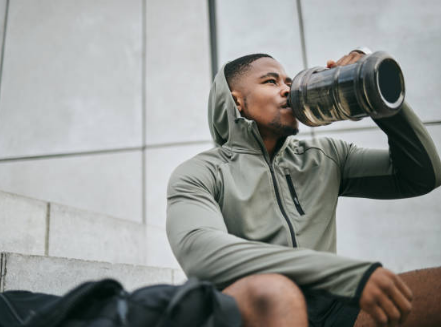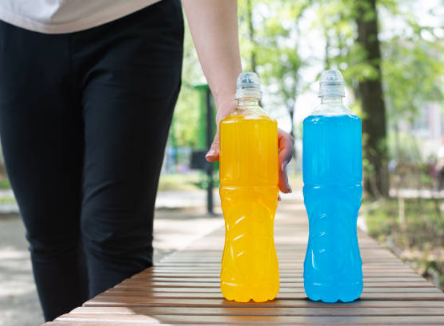Have you ever wondered why you are so thirsty after strenuous exercise or spending an afternoon in the sun? Whenever you sweat, your body loses some of the fluids that keep you hydrated. This consumption puts you at risk of dehydration, which means it’s crucial to stay hydrated. Drinking plenty of water is the obvious solution, but it’s even better if you can drink some electrolyte-rich water.
Why Are Electrolytes Important?
The term “electrolytes” has become a buzzword in the world of fitness and health. You’ve probably heard of them from coaches or health enthusiasts, but what are electrolytes and what do they do to the body?
Simply put, electrolytes are a class of electrically charged essential minerals that the body produces and extracts from food and drink. Minerals such as calcium, magnesium, potassium, phosphate, chloride, and sodium are all important electrolyte examples.

Electrolytes are essential for maintaining a healthy body and mind because they “balance our fluid levels, maintain blood pH, help keep our muscle, nerve, heart, and brain cells working properly, help deliver nutrients to our cells, and flush toxins out of our cells.” In other words: they’re more than just post-workout fuel.
5 Signs That Your Body Needs More Electrolytes
Similarly, if you don’t get enough protein, fiber, or almost any macro- or micronutrient in your diet, your body will let you know that it will send a distress signal when your body needs electrolytes. Experts say these are the top five signs that your body needs more electrolytes.
Sign #1: Your muscles are weak or cramping.
Electrolytes help maintain normal muscle function, so if you experience muscle weakness and/or muscle cramps1, Registered Dietitian Dan Gallagher warns that your body may need to replenish these essential nutrients. “When you’re active, your body depletes the stores of these nutrients, so you need to replenish them regularly,” Gallagher explains. ”
Sign #2: You’re not feeling well.
Dietitian Susan Schacht (MSRDN) says that if you find yourself feeling sensitive or more irritable than usual, the culprit may be a lack of electrolytes. “Electrolyte imbalances can sometimes affect brain function,” Schacht explains,”leading to mood swings, irritability, and even confusion.”
Sign #3: Your stomach is upset.
Feeling nauseous or experiencing gastrointestinal issues? Ellen Landes, MS, RDN, aka Runner Nutritionist, warns that this could also be a sign that your body needs more electrolytes. “A lot of the runners I’ve worked with have experienced nausea at the end of or after a run,” Landers noted. “We’re committed to adding more sodium before, during, and after a run to alleviate this.
Sign #4: Your sodium levels are declining.
In cases of severe electrolyte deficiencies, some people may develop hyponatremia, a condition of low sodium, Landers said. “This can happen if someone drinks a lot of fluids but doesn’t replace the sodium lost through sweating,” Landers explained. ”

However, Landers said hyponatremia is a serious condition that can cause drowsiness, confusion, nausea, muscle weakness and,”in very severe cases, even death.” If you experience any of these symptoms, it is important to consult your doctor.
Sign #5: Your heart is beating abnormally.
If you need more evidence that electrolytes are essential for your health, this is it. According to Sam Schleiger, MS, CLT, IFNCP, a registered dietitian in functional medicine and a specialist in women’s health, electrolytes such as potassium and calcium play an important role in maintaining proper heart rhythms, and imbalances can lead to “irregular heartbeats, palpitations, or rapid heartbeats.” Heartbeat.”
Schleger warns that “severe electrolyte imbalances can even pose a serious risk to heart health,” so you need to make sure your electrolyte levels are always at their best. If you are unsure about your condition, please consult your doctor.
3 Ways to Get More Electrolytes
Here are three easy ways to make sure you’re getting enough electrolytes on a regular basis.
- Enhance Your Pure Water: Don’t have a bottle of electrolyte-fortified water in your fridge? Do not worry. Gandhi explained that getting more electrolytes is as simple as adding salt to water and squeezing lemon juice or drinking coconut water (which is naturally rich in electrolytes).
- Eat more whole foods: Doctor and health educator Kelvin Fernandez, M.D., emphasizes the importance of a well-rounded diet rich in fruits and vegetables when your body craves more electrolytes. “Avocados, bananas, and spinach are excellent sources of potassium, while foods like almonds and tofu can give you a daily dose of magnesium,” Fernández explains. “Our daily diet is an excellent source of [electrolytes], and nature has provided us with it.”
- To add: no one is perfect. Sometimes, you won’t go for fruits and vegetables, or you’d rather save some money than spend money on an expensive fortified bottle. To make up the difference and ensure some electrolyte intake, there are plenty of electrolyte supplements available, such as tablets, powders and capsules, that can be added to water or other beverages, Schacht said.
Electrolytes are just as important as any other vitamin or mineral, so they should be incorporated into your daily routine. Unfortunately, most people don’t get enough electrolytes every day because “the typical American diet lacks many of these micronutrients.” Keep an eye out for these five signs, and your body may be using more electrolytes so that you can better use food, drinks, and supplements to meet your daily needs.